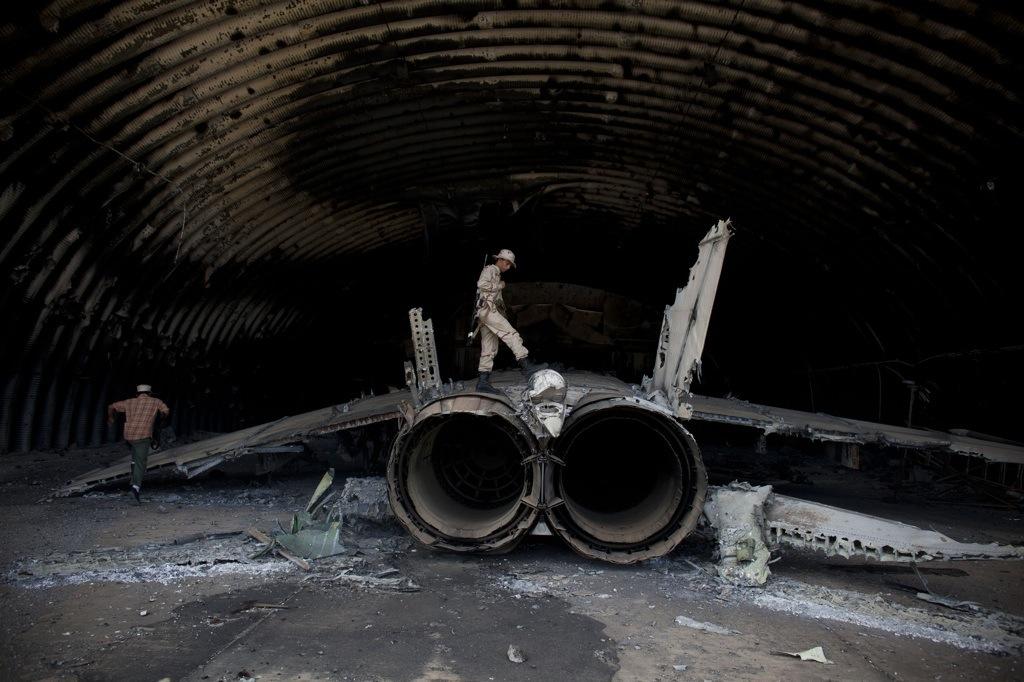NATO reacts cautiously to Gaddafi’s death
National Transitional Council fighters search Libya’s Sirte airport on Oct. 7, after it had been bombed by Nato Fighters.
BRUSSELS — NATO has long tried to downplay the significance of the capture of former Libyan president Muammar Gaddafi. Officials insisted that whether he lived or died, or was caught or escaped was basically irrelevant to its United Nations-mandated role of protecting civilians.
But even so, considering that the biggest remaining threat to Libya's population — the violent battle over Sirte — ended with Gaddafi’s death, the alliance was extraordinarily reticent.
There were conflicting reports about the role NATO airstrikes on Sirte might have played in cornering Gaddafi. Some accounts even suggested he had been killed by such an airstrike. Hours after the National Transitional Council (NTC) publicly confirmed that photos of a wild-haired bloodied man in custody were indeed of the deposed dictator, U.S. President Barack Obama said NATO’s operations would soon be wrapping up.
But NATO Secretary-General Anders Fogh Rasmussen, who spoke later, was more cautious. “We will terminate our mission in coordination with the United Nations and the National Transitional Council,” Rasmussen said in a statement. “With the reported fall of Bani Walid and Sirte, that moment has now moved much closer.”
NATO ambassadors will hold a special session Friday to determine whether, after 215 days of fighting, “that moment” is now.
The usually slow-to-react European Union showed no such hesitation.
Hours before the first NTC press conference in Tripoli, a joint statement from EU President Herman van Rompuy and Commission President Jose Manuel Barroso welcomed Gaddafi’s “reported death” as “mark(ing) the end of an era of despotism and repression from which the Libyan people have suffered for too long.”
It continued: “Today Libya can turn a page in its history and embrace a new democratic future. We call on the National Transitional Council to pursue a broad based reconciliation process which reaches out to all Libyans and enables a democratic, peaceful and transparent transition in the country.”
European Union foreign policy chief Catherine Ashton’s announcement recognized that the death had not yet been confirmed at that point, but it said if true, “the Libyan people can say with pride and confidence that they have shaken off a regime that terrorized and oppressed for more than 40 years. They can now look to the future.”
That enthusiasm could come back to haunt EU leaders when details of Gaddafi’s demise are clarified. Some video being shown on television indicates he was alive when captured, and died afterwards in rebel hands, raising questions about whether the NTC is following the Geneva Convention related to treatment of prisoners.
If it is proven that he didn’t die in a shootout but in a manner more closely resembling an execution, the EU could be reminded that it harshly criticized the hanging of former Iraqi President Saddam Hussein, even after a trial. The bloc is also a strong supporter of the International Criminal Court in the Hague, which had issued an indictment and arrest warrant for the Libyan strongman for suspected war crimes and very much wanted him to face justice there.
Two other men were indicted by the ICC along with Gaddafi: his intelligence chief Abdullah al-Senussi, who was reportedly killed along with him, and son Saif al Islam, whose whereabouts are unclear.
